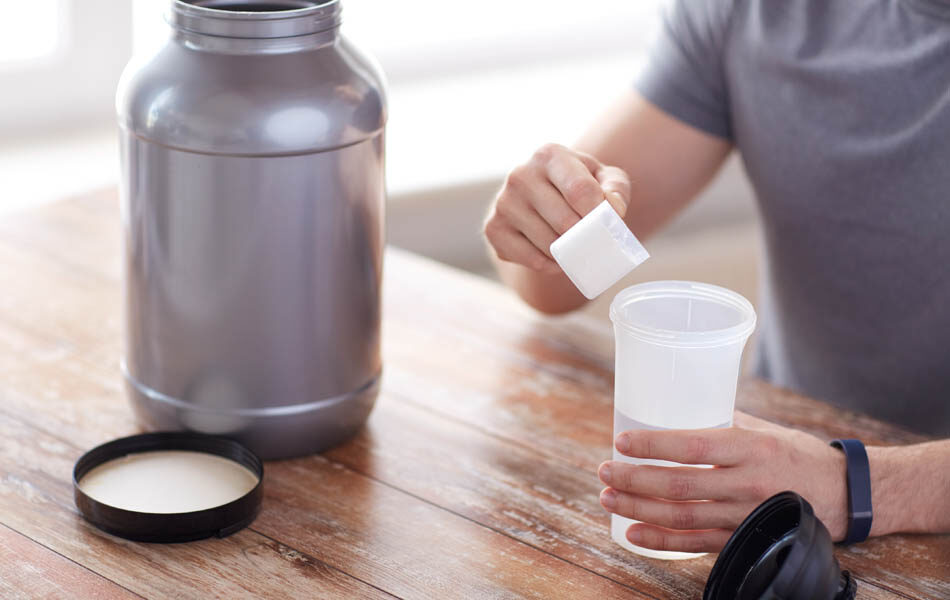Best Supplements for Endurance Athletes: Level Up Your Training Sessions
Discover the 13 best supplements to increase your physical strength, speed, and ability to keep pushing toward the finish line.

Whether you’re into running, cycling, or even gymnastics, there comes a time when you’ll want to boost your stamina, performance, and long-term endurance.
Some people choose to take supplements focusing on energy levels, and others might choose vitamins to boost leg muscle growth.
Whichever goal you’re looking to achieve, with so many supplements on the market, it can be difficult to separate fact from fiction in terms of effectiveness.
For this reason, we’ve put together a guide to help you discover the best supplements for endurance, including how they work, their health benefits, and some drawbacks to consider.
13 Best Supplements for Increasing Endurance
There are many supplements you can select to improve exercise performance, and the choice depends on your long-term goals – from recovery supplements, like protein or caffeine-based extracts, to boosting your energy levels.
Here are the supplements that we will discuss throughout the article:
- Beta-alanine: Increases muscular endurance and lean muscle mass
- Caffeine: Stimulates the nervous system and boosts metabolism
- Electrolytes: Maintain fluid balance to prevent dehydration and muscle soreness
- Glutamine: Helps to build muscle tissue and promotes fast recovery
- Iron: Strengthens energy metabolism for improved performance
- BCAAs: Increase energy during intense exercise and may increase muscle growth
- Vitamins B6 and B12: Boost energy, fuel muscles, and improve immunity
- Beetroot extract: Regulates blood pressure and flow
- Green tea leaf extract: Boosts metabolism and reduces muscle damage
- Vitamin D: Absorbs calcium to maintain strong bones
- Vitamins C and E: Prevent fatigue, fight disease, and may improve aerobic capacity
- Omega-3 fatty acids: Provide energy and prevent inflammation
- Zinc: Supports immune function and maintains strength
#1 Beta-alanine
Beta-alanine is a non-essential amino acid that can improve muscle endurance. This type of acid forms naturally in the body and supports carnosine. Both of these components may reduce muscle fatigue, boost exercise performance, and support muscle recovery after intense sessions.
Some studies show how beta-alanine increases time to exhaustion (TTE) in long-distance runners. People can cycle, swim, or run for longer and boost their time by 13% after 4 weeks of supplementation. In fact, taking beta-alanine for 10 weeks could add an extra 3.2% to their TTE.
Taking this supplement for 3 weeks might also increase lean muscle mass. In the long term, this will improve body composition by encouraging strong muscle growth. Just be aware that beta-alanine won’t make you lose weight, as it mainly focuses on reducing muscle soreness.
Nonetheless, while you can take beta-alanine supplements, there are also foods you can eat, including chicken, salmon, pork, tuna, and beef. The recommended dosage is 2–3 grams daily, depending on how much you exercise and strain your muscles.
#2 Caffeine
Caffeine is well known for its ability to boost endurance performance. Some endurance athletes take this supplement 30–60 minutes before competitive races, as it stimulates the nervous system, therefore regulating arterial blood pressure and blood flow.
One study discovered that people had better endurance after consuming 1.4–2.7mg of natural caffeine per pound of body weight. This means they can complete long-distance running without feeling tired, leading to an overall improved athletic performance in the long term.
Another great benefit of caffeine is that it boosts your hormone levels. For example, it might increase epinephrine – the adrenaline hormone that naturally strengthens endurance performance. Your “fight or flight” response encourages you to reach that dreaded finish line.
People who want to lose weight through endurance sports may also enjoy caffeine supplements, as they could be the key to a fast metabolism. A small dosage has been shown to increase thermogenesis – a process that raises your core temperature and targets the metabolic rate, which burns more calories.
The average dosage before working out is 200–400mg. However, some people can have up to 600–900mg, depending on their weight. You should always start with a low dose, as some people are prone to side effects like headaches and serious constipation.
#3 Electrolytes
If you run, bike, or swim for long periods of time, you’re likely to sweat a lot. During these endurance activities, you lose not only water but also electrolytes, putting you at greater risk for dehydration.
That’s where electrolyte supplements come in, which are essential for maintaining fluid balance, proper muscle contraction, and even brain activity.
It’s recommended for endurance athletes to consume between 300 and 600mg of sodium per hour, as this is one of the main electrolytes excreted through sweat. It’s essential for preventing dehydration during and after training, along with keeping your muscles, heart, nerves, and brain functioning correctly.
Potassium is another critical electrolyte, as low levels can cause a slowdown in nerve and muscle function. This may also lead to muscle cramps, which will impact your speed, pace, and overall distance completed, as well as your post-training recovery.
You could also take magnesium supplements to gain better leg strength and reduce muscle soreness, which provides you with the push you need to keep going for a little longer. Of course, the main benefit of magnesium is that it regulates muscle contraction – a process that keeps your muscles strong.
Calcium is a very important mineral for your bones. Not getting enough calcium could lead to extreme fatigue, brain fog, and muscle cramping. You should get plenty of this mineral to strengthen bone health and boost the protein structures in your leg muscles.
#4 Glutamine
As an amino acid, glutamine is one of the most abundant building blocks of protein within the muscles. Protein is a complex substance that supports the formation of hemoglobin. Your body needs hemoglobin to carry oxygen to your muscles. This process is required for building muscle tissue, especially in those who do weight training or regularly strain their legs running.
Since protein is made up of amino acids like glutamine, it can also boost your immune system. These compounds encourage antibodies to fight germs in the body and kill cells that might cause infections, leading to better health when exercising.
In a study conducted with 200 elite endurance athletes, 81% of those who consumed 5 grams of glutamine after exercise had no infection post-workout. Within the placebo group, only 49% showed no signs of infection during the 7 days following exercise.
However, during endurance training, your body’s glutamine stores break down faster than they are replenished, leading to a loss of muscle mass and compromised immunity.
Therefore, taking a glutamine supplement is important for reducing muscle mass breakdown and promoting faster recovery. This means you’ll be able to get back to training much more quickly.
#5 Iron
Iron is an important mineral that supports growth and development.
Most endurance athletes need iron supplements to boost their performance. This key mineral strengthens energy metabolism, oxygen transportation, and fluid balance. Losing too much iron while exercising could lead to shortness of breath and light-headedness.
To go for long-distance or more intense training sessions, you need to consume plenty of iron. Your body uses the mineral to support hemoglobin in red blood cells, further enhancing muscle function. The more energy your muscles have throughout the day, the more likely you’ll run, cycle, or swim those few extra miles.
A high iron intake may also improve brain, joint, and gut health. Of course, stronger brain development is great for endurance athletes. Iron boosts your concentration levels by stimulating neurotransmitters – signaling molecules that keep your body functioning properly.
The recommended iron dosage is 8.7mg a day for men and 14.8mg a day for women. Remember that consuming too much iron leads to constipation, general weakness, heart palpitations, stomach pain, unintentional weight loss, and frequent exhaustion.
#6 Branched-chain amino acids (BCAAs)
Branched-chain amino acids (BCAAs) are a group of three amino acids: leucine, isoleucine, and valine. Some studies show that BCAAs can retain glycogen stores during intense exercise, which increases the time it takes for you to feel physically worn out.
Your muscles are getting all the glucose they need to function. This obviously supports any kind of endurance exercise, including running workouts. More internal energy prevents muscle breakdown, low immune function, and muscle cramps, further enhancing endurance performance.
A great thing to note is that branched-chain amino acids also increase muscle growth. They stimulate protein synthesis – a process that builds muscle. One study discovered that those who took 5.6 grams of BCAAs a day had 22% more lean muscle compared to people who didn’t.
The daily dosage for these amino acids is up to 20 grams. You can also get BCAAs from foods like eggs, meat, milk, fish, and certain types of poultry. Some experts recommend taking supplements 15 minutes before an endurance exercise to boost energy levels.
It might be worth consulting your doctor before taking BCAA supplements. Consuming large doses could result in fatigue, headaches, low moods, insulin resistance, and coordination problems. These types of issues will stop endurance athletes from achieving their goals.
#7 Vitamins B6 and B12
Vitamins B6 and B12 could be the key substances to better overall health.
You can take vitamin B6 (pyridoxine) supplements to reduce any stress in your body. Pyridoxine encourages your metabolism to break down glucose stores and use them as a reliable energy source. Of course, as you already know, more energy is great for boosting athletic performance.
Some other great benefits of vitamin B6 include a stronger immune system. Consuming this supplement will reduce chronic inflammation, which could slow down any immune response. To exercise properly, you have to feel healthy when putting your body through those long sessions.
Vitamin B12 (cobalamin) is very important for endurance athletes. Cobalamin plays a role in producing red blood cells that transport oxygen. Some endurance events require plenty of oxygen to fuel your muscles and help them function during exercise.
There isn’t a huge dosage for these vitamins, but you should still take them regularly to build muscle strength and boost performance. So, if you’re under 50, you should take 1.3mg of vitamin B6 a day. The same goes for B12, which is 2.4mcg a day.
People with diabetes can also take vitamins when maintaining their blood sugar levels during intense exercise. For example, vitamin B12 does a great job of improving glycemic control and endurance.
#8 Beetroot extract
Beetroot extract may improve cardiorespiratory endurance for many endurance athletes. This is because it has lots of nitrates – chemical compounds that relax your blood vessels and regulate circulation.
Fewer blood pressure spikes mean you don’t have to keep stopping during your long training sessions.
There are some studies that show how beets increase blood flow to muscle fibers, which allows you to speed up your pace without getting muscle cramps. Dietary nitrate especially gives your muscles more power, naturally giving you better endurance over time.
Some people drink fresh beetroot juice, and others take normal supplements before intense training. You’ll mainly be consuming vitamin C, antioxidants, flavonoids, and phenolic acids, along with nitrate. The recommended dosage for nitrate is 3.7mg per kg of body weight a day.
Of course, we can’t forget the other benefits of beetroot extract. This popular supplement contains anti-inflammatory properties. The betalains, which are phytonutrients, reduce certain enzymes that trigger inflammation and increase the risk of heart disease.
Anyone with heart problems may take beetroot supplements to improve their long-term cardiovascular health. Since beets are rich in vitamin B9 (folate), they can repair any damage to blood vessels. In the long term, you’ll have a stronger heart that supports strenuous exercise.
#9 Green tea leaf extract
Green tea extract is a great supplement for endurance athletes. One study found that people’s endurance was boosted by 24% after taking green tea extract for 10 weeks, showing how these caffeine-based dietary supplements may give you the required energy for a long and intense session.
Supplements containing green tea also have L-theanine, an amino acid that reduces muscle damage after exercising for too long. Sore muscles usually stop people from reaching their goals, so it’s important to let your body recover using green tea supplements.
There are more amazing benefits of green tea for weight loss. The high content of catechins may reduce body fat the more you exercise. Catechins serve as antioxidants – compounds that improve triglyceride levels and lower blood sugar in those with diabetes.
Remember that you can’t lose stubborn weight through green tea supplementation. You have to complete intensive training or try an endurance event to burn calories. Green tea extract can only boost your metabolism, encouraging the body to use more hidden fat stores.
#10 Vitamin D
Vitamin D may give your body that extra push it needs to complete your endurance session, helping build lower body strength, prevent falls, and improve performance.
Some people take vitamin D supplements to reduce cytokines – substances that promote inflammation and slow down muscle recovery. This vitamin is known to be a great recovery supplement for endurance athletes, as they don’t need to worry about muscle damage.
Vitamin D is essential for the absorption of calcium, an important mineral for building strong bones in young athletes. Having a vitamin D deficiency means that the body absorbs no more than 10–15% of the calcium you consume, therefore potentially leading to bone breaks, stress fractures, and osteoporosis in the long term.
Athletes can get vitamin D from food sources such as fatty fish, eggs, liver, milk, and some fortified breakfast cereals. However, most of these foods only contain small amounts of the vitamin, so it can be easier to get your daily dosage from the sun’s rays in the form of vitamin D3.
This means your vitamin D levels are likely to be lower in the winter or if you frequently train indoors, which is why taking a supplement is usually necessary. The recommended daily dosage for vitamin D is 600 IU.
Going over this amount could lead to symptoms like stomach cramps, nausea, headaches, heartburn, and fatigue.
#11 Vitamins C and E
Along with playing a role in bone health, vitamin C can support your immune system and help prevent fatigue, which is especially important during endurance training.
Prolonged or intense exercise can cause a temporary increase in the number of free radicals within the body. As antioxidants, these vitamins fight the reactive oxygen species (ROS) to protect your body from tissue damage and disease.
However, although vitamins C and E have been shown to improve aerobic capacity and shuttle run performance for endurance athletes, it’s important to be careful when supplementing these antioxidants.
This is because ROS is somewhat responsible for the positive changes that help athletes’ muscles become better adapted for endurance training. Over-supplementing vitamins with antioxidative properties may negate these adaptations.
Try to consume 15 milligrams of vitamin E per day, as well as 75 milligrams of vitamin C if you’re a woman and 90 milligrams if you’re a man.
#12 Omega-3 fatty acids
Omega-3 fatty acids are healthy, polyunsaturated fats that provide the body with energy and are essential for many important cellular functions.
For instance, they help to prevent inflammation caused by intense training, reducing delayed onset muscle soreness (DOMS) and improving recovery time.
Fatty acids also help the heart work more efficiently by increasing oxygen delivery, lowering its load while performing long-distance exercise. This means that athletes can run, swim, or cycle further and for longer without becoming fatigued.
They’re also known to provide many of the same benefits that exercise offers, including lower risk of type 2 diabetes, cardiovascular disease, cancer, and arthritis.
Two of the most important omega-3 acids are DHA and EPA, which can be found in fatty fish like herring, salmon, and sardines. Along with two servings of fatty fish per week, you should also try to consume ALAs through nuts, seeds, and oils.
Supplements can be useful for those struggling to hit these targets, and it’s recommended for males to consume 1.6 grams of omega-3s and females 1.1 grams.
#13 Zinc
Zinc is an essential mineral that isn’t naturally produced by the body. Therefore, you’ll need to get it through supplements or foods such as meat, poultry, shellfish, legumes, dairy products, vegetables, and whole grains.
Endurance athletes may be at greater risk of zinc deficiency either due to the exclusion of certain foods from their diets or an overall low-calorie intake. As a result, you may suffer from a loss of muscle mass, strength, and power, along with an increased risk of developing osteoporosis.
Zinc is also important for proper immune cell function, so being deficient in this nutrient can lead to impaired immunity. This is problematic for endurance athletes in particular, as it can have a major impact on your ability to train. For example, upper respiratory tract infections are common in endurance sports like ultra marathons.
Achieving the daily recommended intake of zinc is crucial, which is 11mg for men and 8mg for women.
Is It Possible to Increase Endurance With Supplements?
Yes, you can boost your performance when taking the right supplement, so it’s important to find something that works for your unique goals. However, taking supplements won’t increase your endurance alone, so you will need to gradually build up your fitness levels and eat a diet containing a good amount of vitamins, minerals, and healthy fats.
Getting the right nutrition every day can promote faster recovery, making your training sessions less challenging. However, not everyone has time to make several nutrient-dense meals each day, which is where supplements can offer a more convenient option.
There are certain supplements that specifically target endurance training. For example, protein helps maintain muscle mass but can also give your leg muscles the extra strength and energy needed. More energy means you can cycle or run long distances and not feel like the finish line is hard to reach.
A Word From Our MD


When choosing endurance supplements, finding the combination and dosage that works for your unique needs may require some trial and error.
Other tips to boost your endurance include going for power walks, eating nutrient-dense foods, and being consistent. Not following your routine regularly could set back progress significantly, so try to get out of the house, even when you really don’t want to.
You’ll also need to drink lots of water before and after exercise, with the recommended daily water intake being 9 cups for women and 12 cups for men. Sweating gets rid of our only supply of hydration, meaning you have to consume plenty of water to maintain high performance levels.
One final thing is to consult a doctor before buying any supplement. You can gain professional advice on what works best for your personal health. There might also be side effects of each supplement, so it’s better to understand these before delving straight in.
FAQs
Whether you’re a beginner or hoping to improve your average marathon time, there are a range of supplements that can be taken together to support muscle strength, endurance, and immune function.
This includes minerals like zinc, magnesium, and iron, along with vitamin D, glutamine, and omega-3 fatty acids.
Women differ from men in terms of muscle size and strength, body composition, and hormones, which means they may require a slightly different supplement routine.
Some of the best vitamins and minerals for female endurance athletes include vitamin D, calcium, and iron, as deficiencies are common in these nutrients.
One of the best recovery supplements for runners is Orgain, an organic protein powder that reduces muscle soreness, pain, and stiffness while helping you build lean muscle mass. Some other good options include Key Nutrients Electrolyte Recovery Plus and SIS GO Energy.
Conclusion
There are a variety of supplements that improve performance and support endurance training. Glutamine, magnesium, and vitamin D are just a few great options for your dietary regime.
Remember that each supplement does a different thing for your body, so always research their unique traits to find out what will work for your goals.
You should always consult your doctor before trying new supplements, especially if you have a health condition. A medical professional may advise you on what’s best to take in the long term. It’s very important to put your long-term health first before trying any dietary trends.

















































 Select your language:
Select your language: 








